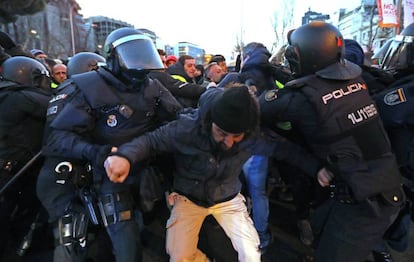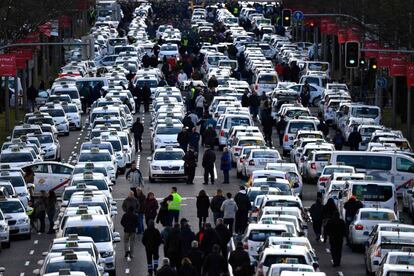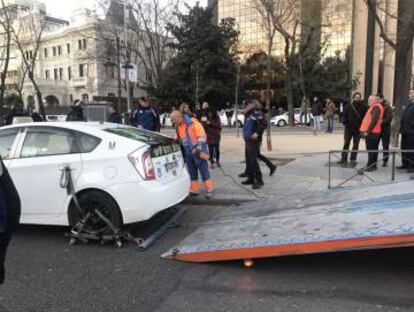Madrid taxi drivers intensify their protest against ride-hailing apps
On day eight of an open-ended strike, riot police were brought in to clear Paseo de la Castellana while fellow cabbies arrived from other parts of Spain to support the action

A taxi strike in Madrid entered its eighth day on Monday, when drivers blocked a major thoroughfare and promised more action with help from colleagues who are coming in from other parts of Spain to support the protest against ride-hailing services like Uber and Cabify.
Hundreds of drivers also congegrated between 11am and 1pm in front of Popular Party (PP) headquarters on Génova street, where they chanted against regional premier Ángel Garrido, of the PP. A new demonstration is scheduled for 5pm in Puerta del Sol, and another one for 7pm on Goya street.

Riot police and tow trucks were sent in this morning to clear Paseo de la Castellana, where parked cabs had brought traffic to a standstill near Santiago Bernabéu soccer stadium. In two hours, riot police had advanced just 200 meters along Paseo de la Castellana while protesters complained about brutality. “They’re hitting us for peacefully defending our rights and our jobs,” tweeted one cab driver.
A central government official, José Manuel Rodríguez Uribes, said that the “legitimate right” to protest does not include “bringing the city to a halt.” He said authorities would guarantee “mobility, traffic and the rights of citizens.”

The protest has taken on political overtones, partly due to the fact that last summer the central government transferred regulatory powers over ride-hailing services to regional governments. Municipal, regional and central authorities, often from different political parties, have since been passing “the hot potato,” in Garrido’s words, to one another while the problem continues to fester.
Last week, taxi drivers blocked access roads to Ifema, Madrid’s main trade exhibition center, where a major tourism fair was being held. And this week they are promising to keep up the pressure unless regional and municipal authorities come up with a more convincing plan to regulate VTC (vehicle for hire) licenses, which companies like Uber and Cabify use to operate.

Drivers in Barcelona ended their strike last week after the Catalan government offered new rules forcing customers to book ride-hailing services up to an hour in advance. But Madrid authorities are not making a similar offer – instead, they are proposing “spatial” regulations, meaning that the VTC vehicle would have to be a certain distance from the customer at the time of booking.
Taxi drivers have described this proposal by Mayor Manuela Carmena and Madrid regional premier Ángel Garrido as “completely insufficient.” And Luis Garicano, an official with the Ciudadanos party, called it “an absurd solution.”
Meanwhile, hundreds of taxi drivers from other parts of Spain have been pouring in Madrid to support their colleagues.
Money at stake
In an internal document seen by EL PAÍS, the central government estimated that companies that operate with VTC licenses, such as Uber and Cabify, will lose around €3.8 billion over the next four years if they are forced out of business by restrictive legislation such as the one taking shape in Catalonia. Each VTC vehicle represents an annual cash flow of €52,667, according to an addendum to the decree that transferred powers over VTC licenses to regional governments.
Government official Rodríguez Uribes said that public order will be guaranteed, but added that resolving the underlying issue is a job that falls to regional premier Angel Garrido.
Last summer, faced with similar protests in Madrid and Barcelona, the central government transferred powers over VTC licenses to regional authorities, which are now having to deal with the problem. Taxi drivers say they will continue their protests until more stringent regulations are applied to what they see as unfair competitors.
English version by Susana Urra.
Tu suscripción se está usando en otro dispositivo
¿Quieres añadir otro usuario a tu suscripción?
Si continúas leyendo en este dispositivo, no se podrá leer en el otro.
FlechaTu suscripción se está usando en otro dispositivo y solo puedes acceder a EL PAÍS desde un dispositivo a la vez.
Si quieres compartir tu cuenta, cambia tu suscripción a la modalidad Premium, así podrás añadir otro usuario. Cada uno accederá con su propia cuenta de email, lo que os permitirá personalizar vuestra experiencia en EL PAÍS.
¿Tienes una suscripción de empresa? Accede aquí para contratar más cuentas.
En el caso de no saber quién está usando tu cuenta, te recomendamos cambiar tu contraseña aquí.
Si decides continuar compartiendo tu cuenta, este mensaje se mostrará en tu dispositivo y en el de la otra persona que está usando tu cuenta de forma indefinida, afectando a tu experiencia de lectura. Puedes consultar aquí los términos y condiciones de la suscripción digital.








































